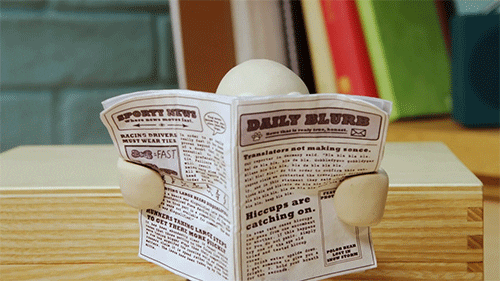You’ve been accepted onto your dream journalism course and the start date is looming… so what do you do next? Here are our top tips on how to prepare for a journalism course.
Read, watch and listen to as much journalism as you can
This may seem obvious, but it’s so important you consume and appreciate a wide variety of journalism.
Not only will keeping up with the news help you stay informed, it will also show you the dos and don’ts of how to report stories.

News Associates deputy managing editor Graham Dudman says: “You’re about to take your first steps into the world of journalism so spend as much time as possible experiencing journalism by reading, watching and listening to the news.
“You should try to read as many news stories as possible every day from a newspaper or news website and watch or listen to at least one full news bulletin from either the BBC, ITN or Sky News. Scrolling through your Twitter echo-chamber does not count as digesting the news!
“Pay attention to how different types of stories are covered and how much detail is or is not included. Know a little about a lot of what’s going on in your area, the UK and the world.”
Practise your writing
Flex those wrist muscles and practise writing, especially if you haven’t written in a while.
You could write a blog, pitch ideas to publications or even just write your own diary.
Practise writing any way you can to keep your spelling and grammar to a good standard – because once you start your course, you’ll realise just how important accuracy is!

Develop your strengths
One of the best things about being a journalist is that you can draw on many weird and wonderful talents you’ve developed through your life.
Can you speak a different language? This is an incredible skill for a journalist to have, so try to keep it up – you can’t underestimate how much this may help your career in the future.
Are you a massive gaming fan? Put your knowledge to good use by writing reviews of your favourite games and consider how you can find opportunities to cover what you’re passionate about during your time on the course.
Do you have an artistic flair? Think about how you could use your illustration or graphics skills to accompany your journalism – multimedia skills are exactly what editors are looking for in 2021.
View this post on Instagram
Develop your weaknesses
Sometimes it’s not only important to think about your strengths, but also your weaknesses.
Research the course you are going to start and look at the modules on offer. Are there any you think you’re going to struggle with? If so, think about how you can develop those skills and prepare questions for your tutors that will help you get started.
You’re doing the course to learn, so it’s okay not to be an expert in everything from the start.
Explore social media
Journalism isn’t all newspapers and TV news… social media plays a huge part as well.
Start following journalists, publications and broadcasters on social media to see how they adapt stories for those platforms.
Twitter is where most professional journalists can be found, so can be an invaluable networking tool.
However, you should also explore other platforms – there is a wealth of quality journalism on Instagram and TikTok too!
Social media is an essential tool for journalists. Here’s how to use Instagram to tell stories! 📱 https://t.co/iFPjaWZy4x
— School of Journalism (@TheJournoSchool) June 24, 2021
Subscribe to newsletters
Subscribing to journalism newsletters is a great way to gain insight into the industry.
Job opportunity newsletters can also give you a good idea of the kind of jobs out there and the skills and qualifications they’re looking for.
You can read our blog on the best journalism newsletters here.
Be prepared to go out of your comfort zone
When thinking about starting your journalism course, you might feel overwhelmed and nervous. That’s perfectly normal but just remember everyone will be in the same boat.
Be prepared to push yourself and go out your comfort zone because that is how you will make the most of your training before finding a journalism job.
At News Associates we don’t call you students, we call you trainees, because we treat you like journalists from day one.
Byline Times editor @Hardeep_Matharu shared her top tips for getting into journalism at #JournoFest 2021! ⬇️ pic.twitter.com/4UVmTbLwL5
— School of Journalism (@TheJournoSchool) August 14, 2021
Don’t worry
Now you know how to prepare for a journalism course, try not to worry and make sure you take some time to relax before the course starts.
You will learn so much on your course and by the end you will leave with the skills, qualification and confidence to walk into any journalism job.
You will also meet knowledgeable and supportive tutors, network with inspiring journalists, and you might even make friends for life. Above all else, remember why you’re doing it in the first place and let your love for journalism shine!
If you want to be a journalist, an NCTJ course is the best way to kickstart your career. Find out more about our NCTJ-accredited multimedia journalism degree here.

